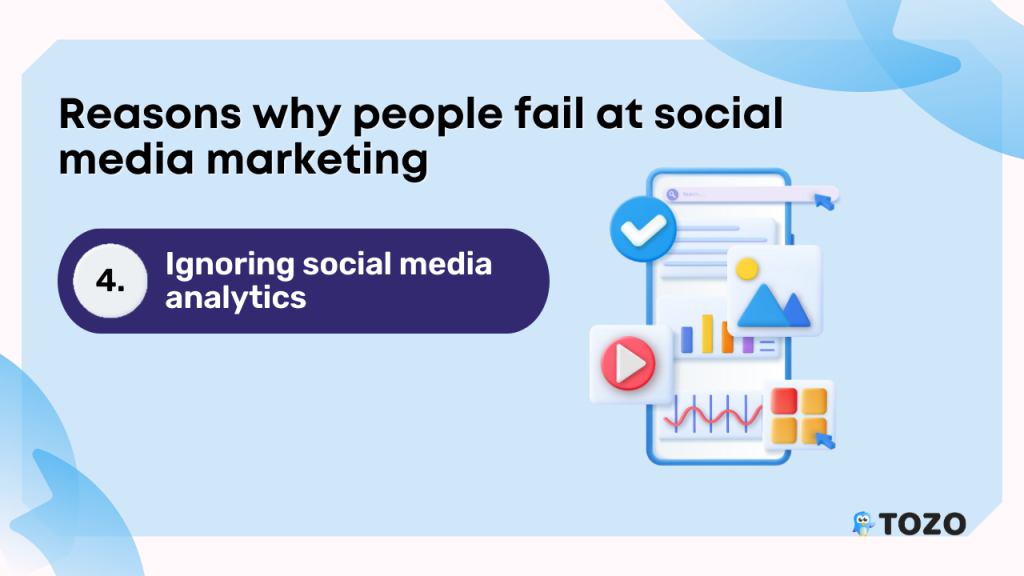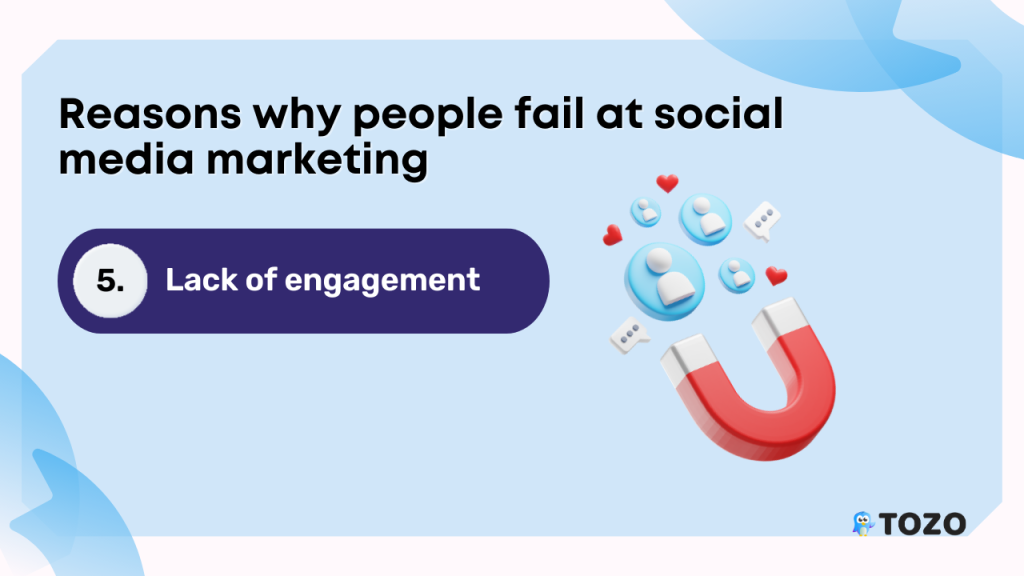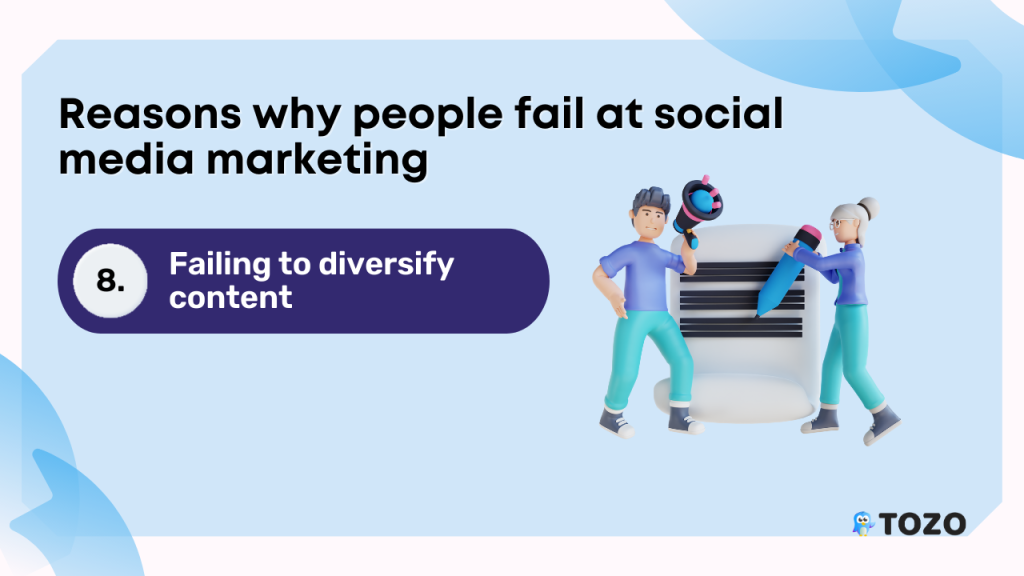Introduction
Social media has become a powerful tool for businesses to reach out to their target audience and increase their brand visibility.
However, despite the potential benefits, many entrepreneurs and marketers fail to leverage social media effectively.
In fact, research suggests that 97% of people fail at social media marketing.
This failure can be attributed to a number of factors, ranging from lack of clear goals to ignoring social media analytics.
In this blog post, we will explore the 9 reasons why so many people fail at social media marketing and provide insights on how to avoid these mistakes.
9 Reasons why people fail at social media marketing:
1. Lack of clear goals :

The absence of well-defined objectives is a leading cause of why individuals fail to succeed in social media marketing.
Many people dive into social media marketing without having a clear understanding of what they want to achieve.
They create accounts on every platform, start posting content, and expect to see instant results.
However, without setting specific, measurable, achievable, relevant, and time-bound (SMART) goals, they fail to create a focused strategy.
To avoid this mistake, it’s crucial to have a clear idea of what you want to achieve with social media marketing.
Your goals should align with your overall business objectives and be based on metrics such as engagement, traffic, leads, and sales.
Having clear goals will help you create a strategy that is targeted, measurable, and effective.
2. Inconsistent posting :

Frequent inconsistency in posting is another factor that leads to the failure of social media marketing efforts.
Posting sporadically or without a set schedule can cause your followers to lose interest in your brand.
Your audience may forget about your business or turn to your competitors who post more regularly.
To avoid this mistake, create a content calendar that outlines your posting schedule across all social media platforms.
This will help you maintain a consistent and predictable presence online.
You can also use scheduling tools like Tozo.Social to plan and schedule your posts in advance, ensuring that your content is posted at optimal times for your audience.
Consistent posting will help you build a loyal following, increase engagement, and improve your overall online presence.
3. Not understanding the audience :

Another critical factor in social media marketing is understanding your target audience.
Failing to identify and understand your audience can lead to a lack of engagement and ineffective campaigns.
To connect with your audience, it is essential to understand their needs, preferences, and pain points.
Conducting market research, creating buyer personas, and analyzing social media insights can help you gain valuable insights into your target audience.
This information can help you create content that resonates with your audience and develop a more effective social media strategy.
By understanding your audience, you can tailor your messaging and content to meet their specific needs and preferences.
This approach will increase the chances of your audience engaging with your brand, building a loyal following, and achieving success on social media.
4. Ignoring social media analytics :

Neglecting to utilize social media analytics is a crucial error that numerous marketers commit.
Analytics provides valuable insights into the effectiveness of your social media campaigns.
It allows you to see how your content is performing, which posts are driving engagement and traffic, and which ones are not.
Without analyzing your social media data, you won’t know what’s working and what’s not, making it difficult to optimize your strategies.
Analytics also helps you identify your audience demographics, which can help you tailor your content to their preferences and interests.
Therefore, regularly monitoring and analyzing your social media metrics is crucial for improving your overall marketing efforts.
5. Lack of engagement :

Insufficient engagement is a significant factor behind the lack of success for many individuals in social media marketing.
Simply posting content without interacting with your audience is not enough to create a strong online presence.
Social media is a two-way street, and it is important to actively engage with your followers by responding to comments and messages, asking questions, and starting conversations.
Building a loyal community requires consistent effort and attention to your audience’s needs and interests.
By engaging with your followers, you can create a stronger connection and build trust with them, which can ultimately lead to increased engagement, brand loyalty, and ultimately, more business success.
6. Overpromoting :

One of the most common reasons for social media marketing failures is over-promoting.
While it’s essential to promote your products or services on social media, constantly bombarding your audience with promotional content can backfire.
Social media users are not interested in being sold to all the time; they want to engage with content that offers value and entertains them.
Entrepreneurs must find the right balance between promotional and non-promotional content to keep their audience engaged.
Creating content that offers value to your audience, such as educational or entertaining content, can help you build a loyal following.
Promote your products or services occasionally, but ensure that most of your content is non-promotional and valuable to your audience.
7. Using irrelevant hashtags :

While hashtags can amplify the reach of your social media posts, incorporating irrelevant hashtags can have an adverse effect on your social media marketing endeavors.
Misusing hashtags that are unrelated to your brand or post can create ambiguity for your audience and undermine your credibility.
It is important to use relevant hashtags that are related to your brand and the content you are sharing.
Before using a hashtag, research its popularity and relevance to your post.
You can also create your own branded hashtags to help you build your brand identity and make it easier for your audience to find your content.
8. Failing to diversify content :

One of the factors that contribute to the failure of social media marketing is the failure to diversify content.
Creating and posting the same type of content repeatedly can become monotonous and uninteresting to your audience, resulting in a decline in engagement and following.
To avoid this, entrepreneurs need to mix up their content, including images, videos, GIFs, infographics, and blog posts.
Additionally, it is important to consider the timing and frequency of your posts. Posting at the same time every day or week can also become predictable and tiresome for your audience.
Therefore, vary your posting schedule to keep your audience engaged and interested in your content.
9. Not leveraging influencers :

Influencer marketing has grown in popularity as a means of helping firms connect with their target demographic.
However, many businesses fail to utilize this strategy to their advantage.
Collaborating with influencers who have a significant following and influence within your industry can help you reach a wider audience and build credibility for your brand.
Failing to leverage influencers is a missed opportunity to tap into their network and gain new followers.
It is crucial to research and identify the right influencers for your brand and establish a mutually beneficial relationship with them.
By collaborating with influencers, you can expand your reach, build trust with your audience, and ultimately drive more traffic and sales for your business.
Conclusion
Social media marketing can be a powerful tool for businesses, but it requires a strategic approach and consistent effort.
The nine reasons why 97% of people fail at social media marketing highlight common mistakes that can derail a social media strategy.
Businesses can improve their social media presence and reach their marketing goals by setting clear goals, understanding the audience, using analytics to track progress, engaging with followers,etc.
By avoiding these common pitfalls and focusing on a well-planned and executed strategy, businesses can stand out on social media and gain a competitive edge in their respective industries.



